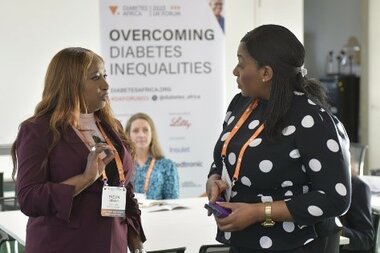29 November 2023
KHP Diabetes, Endocrinology and Obesity (KHP DEO) has partnered with Diabetes Africa to deliver an inspiring, education and empowering Overcoming Diabetes Inequalities event.
Hosted by Diabetes Africa, KHP DEO supported their vision of improving diabetes outcomes for people of black heritage living in the UK. There was an impressive range of speakers exploring the impact of diabetes on the body, from the eyes to the feet. Other topics included Clinical Glucose Monitoring (CGM) & technology, Spread & Scale, research considerations, commissioning processes, and reviewing culturally tailored programmes for healthy living.
Six of the ideas we’ve taken away:
- Are we using the right language?
There was a huge challenge to the term ‘hard to reach’ as it’s seen to put the blame on the patient. ‘Underserved’ or ‘need to reach’ is a more preferred term. There was a strong view that the current systems and processes make it hard to engage certain groups. It is not that the individual does not want to engage.
2. Have we considered cultural variations?
Even if patients are following NHS treatment advice, a question was posed as to what are patients doing that may impact their treatments? What other sources of information might be reaching them and affecting their actions? One example given was of a patient using olive oil and garlic to attempt to treat her cataracts.
The ‘Co-creation and Cultural Humility in diabetes’ session facilitated by Dr Sophie Harris (Diabetes & Endocrine Consultant, King’s College Hospital NHS Foundation Trust) was a thought-provoking item. The panel included researchers and a patient with type 1 diabetes who moved from Nigeria to UK and was initially misdiagnosed. The panel discussed and emphasised the importance of research from minoritised groups, and how medical compliance is influenced by discrimination in healthcare and society.
A historical perspective was also provided with references made to the Windrush ‘unseen seen’, Colonial and War Office and how the landscape allows inequalities to take root. A conclusion was that the NHS should give more space to community structure and recognise the partnerships needed to tackle inequalities together through co-design and co-creation.
HEAL-D was an insightful session delivered by Prof Louise Goff which aims to develop and evaluate an evidence-based and culturally tailored programme. The session highlighted the importance of co-design and community engagement; with participants highlighting cultural barriers i.e. ‘she didn’t have a clue what we ate’; going to the gym is not part of my culture’.
3. Improving representation in research
Collectively we need to ensure the proportion of participants in research is representative of the population of participants the treatment intervention will serve. In particular, more diverse recruitment was needed for biobanks, where in one example just 2% of participants in a research group were included, despite it being the main ethnic group that would be affected by the outcomes.
4. Great practice in London
ROAM (Research Opportunities at Moorfields) is an innovative platform open and transparent to patients. Moorfields Eye Hospital NHS Foundation Trust’s mission statement is “People's Sight Matters”. Designed in collaboration with the patient and public involvement groups, ROAM application is for anyone with an eye condition, as well as healthy family members and friends.
5. Technology offers opportunities, but also brings barriers
Several of the sessions focused on increasing equity of access to diabetes technologies, including continuous glucose monitoring sensors (CGMS), insulin pumps, and hybrid closed loop. There is a particular disparity in access to CGMS amongst people with type 2 diabetes, as under the current NICE guidelines, this is limited under the NHS to those with problematic control but can be paid for privately. The barriers to accessing technology were discussed, including the stigma of wearing a visible device, which are often white and stand out more against darker skin tones.
6. The importance of feet
Feet are an overlooked and undervalued diabetic complication, until a digit or limb is amputated. Following an amputation, the life expectancy can reduce five years on average. Diabetes can affect every part of the body, highlighting the vital importance of patient and clinical education around prevention to reduce the occurrence of these complications. This was an interesting and educational talk delivered by Dr Chris Manu, Consultant Diabetologist at King’s College Hospital NHS Foundation Trust.
The KHP Diabetes, Endocrinology, and Obesity teams works to improve health and wellbeing for people living with diabetes, obesity and endocrine disorders across London, south east England and beyond. Visit its webpages here.





